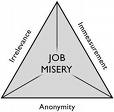Leadership Catalyst Blog
Irrelevance: The Second Sign of a Miserable Career Transition
All Blog Posts, Change, Motivation / 20.05.2010
 In my May 13th post, I talked about how Lencioni’s three signs of a miserable Job are often present during career transition, and addressed how to avoid his first sign: anonymity. Today I am focusing on how to avoid the second sign–irrelevance. Before doing so, however, I want to broaden the context of career transition to include not only job search, but also transitions such as retirement, staying home to raise a family or be a caregiver, or even making a transition from college to your first professional job. All of these transitions require a recalibration of why you count, how you count, and what you count. For simplicity, in this post I’ll continue to illustrate my points with job transition examples.
In my May 13th post, I talked about how Lencioni’s three signs of a miserable Job are often present during career transition, and addressed how to avoid his first sign: anonymity. Today I am focusing on how to avoid the second sign–irrelevance. Before doing so, however, I want to broaden the context of career transition to include not only job search, but also transitions such as retirement, staying home to raise a family or be a caregiver, or even making a transition from college to your first professional job. All of these transitions require a recalibration of why you count, how you count, and what you count. For simplicity, in this post I’ll continue to illustrate my points with job transition examples.
Irrelevance occurs when you have trouble seeing how what you are doing really makes a difference. For example, after months of networking with no job offers, it is easy to become discouraged and question whether you are just wasting your time. As my friend Kari once quipped, “at the end of the day, how do you know if it was a good day, or just a waste of make-up?”

The key to avoiding irrelevance is to break your goal of finding a job down into a handful of meaningful objectives, driven by supporting projects, which in turn, help you prioritize and balance your daily activities. If you don’t, you run the risk of getting lost in an endless sea of tasks–networking, searching the internet, completing on-line applications, perfecting your resume, and trying to develop an online presence through LinkedIn, twitter, or blogging. All of these things are important, but without seeing a direct connection between your daily activities and your intermediate objectives and your ultimate goal, it is easy to become disengaged, and well, miserable.
♦♦♦♦♦♦♦♦♦♦♦♦♦♦♦♦♦♦♦♦♦♦♦♦♦♦♦♦♦♦♦♦♦♦♦ LEADERSHIP CATALYST TIPS ♦♦♦♦♦♦♦♦♦♦♦♦♦♦♦♦♦♦♦♦♦♦♦♦♦♦♦♦♦♦♦♦♦♦♦
To avoid irrelevance during your career transition:
- In addition to career transition goals, set meaningful personal goals in areas such as: Family/friends, finances, fitness, fulfillment and fun. Setting and achieving measurable goals in each of these areas enables you to maintain balance and a positive attitude, which is critical to a successful job search. For example:
- Fulfillment: Give back. Engage in 2 community activities per month that help you feel productive, engaged, and self-confident. Each of these components can be missing when going through career transition, so creating opportunities to fill that gap will help you achieve greater success in the job search process.
- Set an overarching career transition goal with several quantifiable supporting objectives. For example, “Generate a cumulative 3 year income of $300,000, doing what I love and providing enough flexibility to achieve my personal goals.” Examples of supporting objectives for this goal include:
- Generate at least 2 interesting job offers by 12/31.
- Discover 5 relevant openings within 1 week of their initial posting by 12/31
- Schedule 12 face to face meetings per month with target companies through personal networking by 12/31.
- Attend at least 4 networking events per month.
- Generate 4 job leads per month through my on-line presence on LinkedIn, a blog, and twitter. Possible supporting projects might be:
- Optimize LinkedIn so I am among the top 3 people identified when searching on key words by which I want to be found and so I appear in 50 searches a day.
- Blog at least weekly and increase the number of views to 25 a day.
- Use this hierarchy to drive your weekly calendar and significant next actions, and you will be able to measure your progress on a weekly basis, and avoid “immeasurability”, the third sign of a miserable career transition, and the subject of my next blog post.
♦♦♦♦♦♦♦♦♦♦♦♦♦♦♦♦♦♦♦♦♦♦♦♦♦♦♦♦♦♦♦♦♦♦♦♦♦♦♦♦♦♦♦♦♦♦♦♦♦♦♦♦♦♦♦♦♦♦♦♦♦♦♦♦♦♦♦♦♦♦♦♦♦♦♦♦♦♦♦♦♦♦♦♦♦♦♦♦♦♦♦♦♦♦♦♦♦♦




